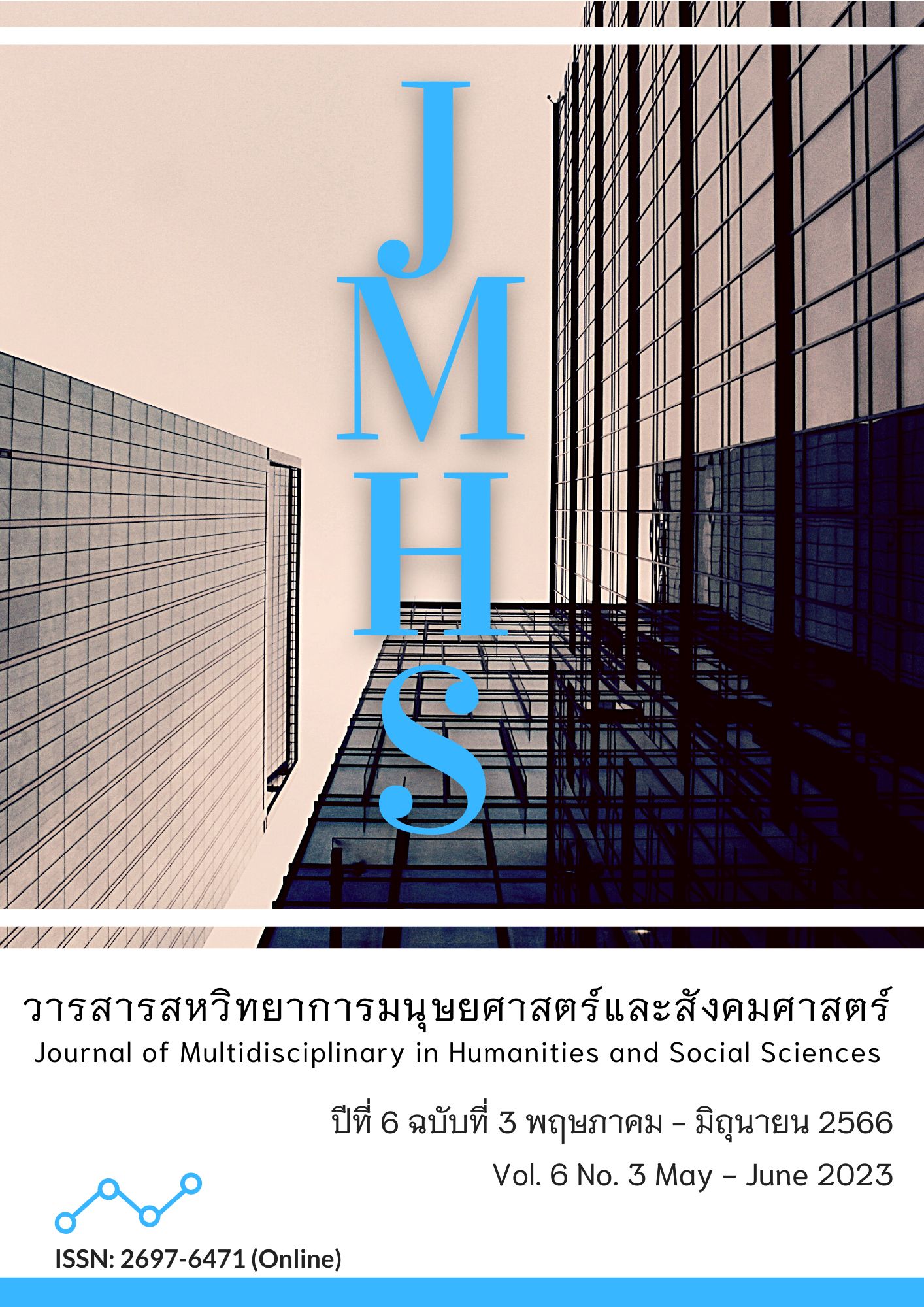Factors Influencing the Service Innovation Performance of the Government Agencies in Thailand
Main Article Content
Abstract
The Ministry of Interior, which is a central government agency in the category of ministries in Thailand, has the authority to deal with suffering, nourish happiness, maintain public order, and pay attention to service innovation performance and the application of innovation in the operation of the Ministry of Interior. This research aimed to 1) study the influence of the Ministry of Interior on service innovation performance and 2) develop a linear structural equation model. The sample group was composed of 340 executives of the Ministry of Interior. Sampling was done in 2 steps: specific and quota random sampling. This study was quantitative, and the research tool was a structured questionnaire. The data were analyzed by percentage, mean, standard deviation, skewness, kurtosis, confirmatory component analysis, and structural equation model analysis. The research findings revealed that Organizational Culture, Knowledge Management, and innovation activities influenced the Innovation Performance of government agencies in Thailand through Innovation Capacity variables at the statistical significance level (p<.01) and Innovation Capability directly influenced the Innovation Performance of government agencies in Thailand at the level of statistical significance (p<.01). The results of the development of the structural equation model revealed that the variable that had the highest overall influence on the service innovation performance of the Ministry of Interior was Innovation Activities. It was concluded that 1) Organizational culture level knowledge management innovation activities all aspects of innovation ability are at the highest level 2) The model of measuring variables is consistent with theory. The observed variables had component weights between 0.25 - 0.46, and 3) structural equation analysis (p=0.00, X2/df= 2.33, RMSER= 0.00, RMR= 0.04, GIF=0.92, AGIF=0.84).
Article Details

This work is licensed under a Creative Commons Attribution-NonCommercial-NoDerivatives 4.0 International License.
Views and opinions appearing in the Journal it is the responsibility of the author of the article, and does not constitute the view and responsibility of the editorial team.
References
Anand, P., & Saraswati, A. K. (2014). Innovative Leadership: A Paradigm in Modern HR Practices. Global Journal of Finance and Management, 6, 497-502. http://ripublication.com/gjfm-spl/gjfmv6n6_02.pdf
Asgarian, A., & McClure, G. (2012). Impact of seismic retrofit and presence of terra cotta masonry walls on the dynamic properties of a hospital building in Montreal, Canada(Master of Engineering). Department of Civil Engineering and Applied Mechanics, McGill University.
Azmi, K.R. (2019). The Hoping Thinking Skill Model for Parents in Islamic Counseling Through Experiential Learning to Improve Children's Optimistic Attitude. Konseling Religi: Jurnal Bimbingan dan Konseling Islam, 10(1), 156. DOI:10.21043/kr.v10i1.5591
Boonthong, P. (2018). The Sanggha Administration of the Sanggha in Southern Thailand. Journal of MCU Nakhondhat, 5(1), 30-44. Retrieved from https://so03.tci-thaijo.org/index.php /JMND/article/view/153391
Chansorn, W., & Phatranarakun, P. (2009). Evaluation in an open system. (11th ed.). Bangkok: National Institute of Development Administration.
Daniel, V.M., de Lima, M.P., & Dambros, A. (2017). Innovation capabilities in services: A multi-cases approach. Academia Revista Latinoamericana de Administración, 30(4), 490-507. DOI:10.1108/ARLA-06-2016-0161
Euskal Estatistika Erakundea. (2017). Metodo Bayestarrak Estatistika Ofialean 2017. Instituto Vasco de Estadística.
Hassan, M. M., Bashir, S., & Abbas, S. M. (2017). The Impact of Project Managers’ Personality on Project Success in NGOs: The Mediating Role of Transformational Leadership. Project Management Journal, 48, 74-87. https://doi.org/10.1177/875697281704800206
Humphrey, C. (2021). New shareholders for multilateral development banks: a viable approach to increase development finance?. ODI Emerging Analysis. Retrieved from https://odi.org/en/publications/new-shareholders-for-multilateral-banks-a-viable-approach-to-increase-development-finance/
Kammani, A., & Date, H. (2009). Public sector knowledge management: A generic framework. Public Sector ICT Management Review, 3(1), 1–14.
Kim, D.H., Lee, J., Kim, J., & Yoo, S. (2020). The meaning of neighborhood and perceived healthy lifestyle of young single-person households experiencing housing poverty. Korean Journal of Health Education and Promotion, 39(5), 1-13. DOI: https://doi.org/10.14367/kjhep.2022.39.5.1
Lorsuwannarat, T. (2009). Organization of knowledge: from idea to practice. Bangkok: Sat Four Printing.
Malee, S. (2007). Knowledge Management: Innovation and Human Resource Management. Civil Service e-Journal, 53(4), 40-45.
Naranjo-Valencia, J.C., Jiménez-Jiménez, D., Sanz-Valle, R. (2016). Studying the links between organizational culture, innovation, and performance in Spanish companies. Revista Latinoamericana de Psicología, 48(1), 30-41. https://doi.org/10.1016/j.rlp.2015.09.009
Niyomves, B., Songsraboon, R., Thongtao, J., Chaijariyavet, S., & Opaspong, P. (2022). Service Innovation Affecting the Success of Using the Food Ordering Application During the COVID-19 Pandemic. Interdisciplinary Academic and Research Journal, 2(4), 433–446. https://doi.org/10.14456/iarj.2022.68
Piteira, M. (2013). “Professions in a changing world: The role of creativity.” In International Sociological Association. ISA RC52 Interim Conference, Technical University of Lisbon, Protugal, 28-30.
Ramli. (2013). The Influence of School Culture on Productive Competencies of Students in West Sumatra State Vocational Schools. UNY: Journal of Educational Horizon Th, XXXII(2), 307-314.
Razul Ikmal Ramli., Norihan A. Hassan., Aini Suzana Arifin., & Aini Suzana Arifin. (2017). Factors Influencing Public Sector Innovation Performance in Malaysia: Structural Equation Modelling Approach. International Journal of Academic Research in Business and Social Sciences, 7(2), 629-645.
Robbins, B.G. (2016). What is Trust? A Multidisciplinary Review, Critique, and Synthesis. Sociology Compass, 10, 972– 986. DOI:10.1111/soc4.12391
Sahoo, S. (2019). Quality management, innovation capability and firm performance: Empirical insights from Indian manufacturing SMEs. The TQM Journal, 31(6), 1003-1027. https://doi.org/10.1108/TQM-04-2019-0092
Serrat, J.M.B. (2012). The role of the DCFR in travel contracts: toward an optional instrument? Journal of European Consumer and Market Law, 2, 95-103.
Shahzad, F., Xiu, G.Y., & Shahbaz, M. (2017). Organizational Culture and Innovation Performance in Pakistan’s Software Industry. Technology in Society, 51, 66-73. https://doi.org/10.1016/j.techsoc.2017.08.002
Teerawattanakul, P., & Rattanarumitsorn, T. (2019, February 27). “Government Innovation”: Flipping levers Makeover Thailand. Bangkokbiznews. Retrieved from https://www.bangkokbiznews.com/blogs/columnist/121579
Wutthirong, P. (2014). Innovation Management: Resources, Organization of Learning and Innovation. Bangkok: Chulalongkorn University Press.
Yeşil, S., & Kaya, A. (2012). The Effect of Organizational Culture on Firm Financial Performance: Evidence from a Developing Country. Procedia-Social and Behavioral Sciences, 81(28), 428-437. http://dx.doi.org/10.1016/j.sbspro.2013.06.455
Zaied, A. (2012). An Integrated Knowledge Management Capabilities Framework for Assessing Organizational Performance. International Journal of Information Technology and Computer Science, 4, 1-10. http://dx.doi.org/10.5815/ijitcs.2012.02.01


